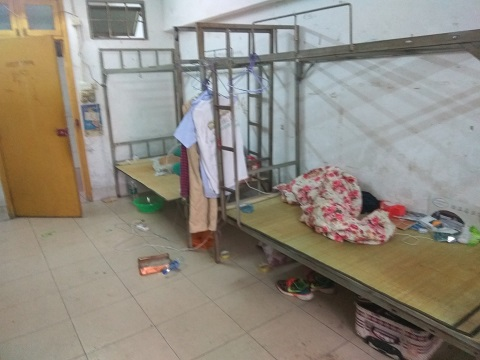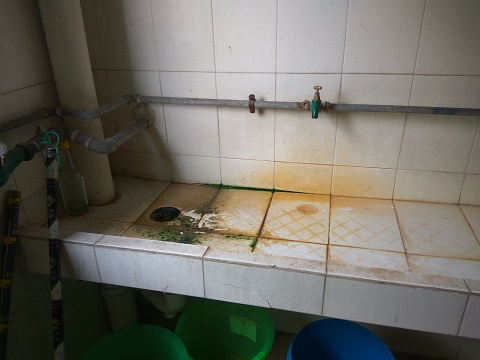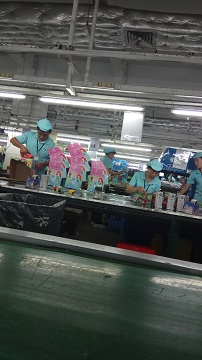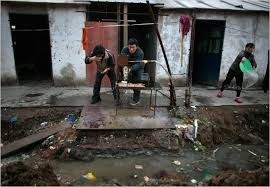Project 2: Apple's Humanitarian Epidemic
- Elizabeth Kennedy

- Nov 14, 2019
- 13 min read
The Ethics of Apple’s Outsourcing to Foxconn and Its Impacts on Chinese Laborers and The Global Market
Introduction
Following the Industrial Revolution, the structure of the labor force and factory conditions have only slightly evolved. Industrial labor forces have been faced with harsh conditions in the industrial factories, low safety regulations, and low wages for long working hours. Although the majority of countries that have industrialized have made laws to improve conditions, Chinese sweatshops still have unethical health conditions and take advantage of their employees. China has placed limited regulations on sweatshops but Chinese politicians have neglected the humanitarian issues of sweatshops for a boost of the country’s gross domestic product (GDP). This humanitarian issue impacts the very economy of the globe because global economies take advantage of China’s low labor costs through outsourcing, the Chinese laborers are at a disadvantage. Activist groups, like that of China Labor Watch, argue that outsourcing abuses and exploits the workers of Chinese sweatshops, but other groups such as the government, outsourced corporations, and the workers, have differing perspectives. The ongoing rate of outsourcing gives jobs to poor Chinese laborers, gives them a higher standard of living than the rural Chinese population, but exploits the rights of the workers while damaging their health. One of the biggest leaders in American corporations outsourcing their labor in poorly regulated Chinese sweatshops is Apple and their manufacturer Foxconn (Ngai, 2014). Apple brings a lot of money to rural provinces in China by providing a more stable income rather than the volatile income from the normal agricultural work in rural China. However, Apple and Foxconn have been known to have major issues in the working conditions of their factories as numerous workers have been reported to have committed suicide and suffer from the conditions (Ngai, 2014). Although there are economic benefits to Apple’s Chinese Foxconn sweatshop factories, the sweatshop conditions need to be regulated as their conditions put their workers at risk.
The Harsh Conditions in Chinese Sweatshops Violate Workers’ Rights
Throughout the years, big American corporations, such as Apple, Sony, and Dell, have outsourced their manufacturing to Chinese factories. These factories tend to have harsh conditions that endanger the safety of their laborers, also known as a sweatshop. Around the world, the conditions of the Chinese sweatshops are increasing being exposed. Activist groups from all over the world have tried to create awareness of the conditions in sweatshops and the effect it has on the Chinese laborers. China Labor Watch, a non-profit activist organization, is known to have fought for worker’s rights in China and put their efforts into creating a greater awareness of Chinese sweatshops in the American consumer mindset. In the China Labor Watch’s article, “An Investigation into Four Toy Sweatshops”, the true conditions of factory life in four sweatshops that export products for major foreign competitors is shown. Some of the companies that the factory mass-produces toys for are Disney, Mattel, Fisher-Price, and McDonald's. These factory workers suffer through “11 hours every day, 6 or 7 days a week” only to “earn minimum wage” (China Labor Watch, 2016). These long working days in, what the CLW phrased as, “toxic working environments” have been proven to be an extreme violation of the rights of Chinese laborers (China Labor Watch, 2016). Chinese laborers in these kinds of sweatshop factories are paid small amounts. In some factories, like those that make Disney, Walmart, and Dell products the conditions are harsh and the pay is low. These factories pay “workers less than minimum wage” in China (Barbosa, 2008). The minimum wage of China differs from province to province, but in the province that these factories were located, the factories paid the workers less than “55 cents an hour” (Barbosa, 2008). Thousands of multi-million-dollar companies from America export their labor to be cost-effective but at the cost of worker’s health and rights.
Chinese laborers have their rights violated by American corporations and the Chinese industrial sector not only by the lack of meeting the minimum wage but the lack safety regulations as well. In the factories shown in pictures from CLW as shown below in figures 1-3, the workers are compacted in filthy on-site living conditions where mold grows from their sink drains(Figure 3), 5-10 workers sleep in a dorm-like room, and the only thing provided by the factory are the steel bed posts, water, and electricity as depicted in Figure 1. Conditions like those found within the factories that CLW describes are conditions that can be found in many factories all over China. Many Chinese laborers work side-by-side in cramped areas along hundreds of conveyor belts in room where there is no regulated temperature air flow nor clean conditions for hours a day as seen in Figure 2. In other factories, you can see conditions very similar to that of Figure 4. Sweatshops rarely have clean amenities. Usually within a sweatshop, the workers are in charge of keeping things cleaned, as seen in Figure 4.
The conditions of Chinese sweatshops have been seen by the Executive Commission on China as a need to step in to reform labor laws in China. Although the conditions are known to be horrendous in Chinese sweatshops, activists, oversea governments and every day consumers are confused on who to put the blame upon. Is it the Chinese government’s fault for not creating stricter regulations on labor, or is it the American corporations’ fault for taking advantage of the Chinese labor system? The Executive Commission on China believes that the U.S. government should step in to reform labor laws China in order “…to draw attention to… critical issues” (Congressional-Executive Commission on China, 2012). The commission believes that it is the government’s fault for not protecting the rights of the exploited sweatshop workers, but activists think differently.
Apple’s violation of worker’s rights leads to suicide
Apple has been known to be one of the leading American corporations that takes advantage of cheap labor in China. Apple’s subsidiary manufacturing company, Foxconn, has shown to have rising issues in the correlation of their working conditions and their rates of workers attempts of suicide. Foxconn is the biggest electronic outsourcing manufacturer that runs sweatshop-like factories. Foxconn’s abuse of Chinese labor rights and complete disregard for the regulations set by the Chinese government has led to rising issues in China as well as globally. The International Committee of the Fourth International has found that the working conditions in Foxconn’s factories were increasing the rate of laborers’ attempt to commit suicide. Author John Chan stated that the 13 workers that have so far attempted to commit suicide as they “were unable to bear the stress, alienation, and humiliation they experience daily” (Chan, 2010). Prior to 2010, there have been 10 suicides where workers “flung” themselves off the top of the factories. Chan reasons that the stress is caused by the harsh conditions of the factories, in which he follows up with a description of the conditions. In 2010, there were 18 sited attempted suicides of workers “between the ages of 17 and 25” where only 14 were successful. (Litzinger, 2013). The news of these attempted suicides of the workers took the media by storm as they broadcasted images of the workers and their attempts. In response, Foxconn “[put] up safety nets between factory and dormitory buildings on its factory complexes” to catch and prevent any more attempted suicides (Litzinger, 2013). This only furthers the notion that Foxconn, and therefore Apple, only cared about the issues when the media took notion of them. Foxconn also hired psychologists to test the remaining workers for any mental issues that would result in more suicides as to prevent another story with the amount of coverage the previous ones had. Foxconn made it seem like “It was as if suicide in a factory setting could not have anything to do with the conditions under which these young workers toiled—the long hours, the repetitious tasks on the factory floor, the lack of overtime pay, the crowded dormitory spaces, the alienation from home, and the empty modernity promised through a life of urban factory living”(Litzinger, 2013).
From low wages, no safety regulations, poor housing, and long work hours without breaks, it is clear to see as to why the Foxconn employees decide to kill themselves. Many activists and researchers like Ralph Litzinger and John Chan believe these suicides and the newer attempts are due to the brutal exploitation of Chinese workers. The conditions within the factory are military like and were “typical in export factories in China” (Chan, 2010). Chan continues to explain that the conditions of the sweatshops psychologically damage a person’s way of thinking. One worker had said that “Life is meaningless” (Chan, 2010). We can no longer neglect these conditions. No number of workers should die to make Foxconn fix their conditions. However, Foxconn insists on keeping their conditions to maximize their profits. Foxconn, in order “to save money, did not provide proper ventilation during the cleaning process, workers developed neurological problems, the loss of motor function, and experienced numb limbs; others complained of constantly fainting and being overcome by a debilitating fatigue” (Litzinger, 2013). Instead of fixing the issues that cause these health conditions, Foxconn bribes the ill workers “with a lump payment of 80,000 or 90,000 yuan ($12,000–$14,000), but only after signing an agreement stating they would not bring claims against Apple or its supplier companies in the future” (Litzinger, 2013). This agreement includes a fine print agreement that the worker will not talk to any media personnel or they would face legal actions. Foxconn has consistently been trying to cover up the harsh conditions they put their workers through.
Still, Foxconn refuses to change their policies to accommodate their large workforce of “1.4 million employees;” By doing so, they unethically control the lives of the workers while paying them little considering the amount the Taiwanese company makes (Ngai, 2014). Apple’s use of Chinese labor through their subsidiary manufacturing company, Foxconn, has led to increased awareness on the types of conditions that are found in Chinese sweatshops. Due to Apple being a famous company, the manufacturing process is more scrutinized. Apple has still yet to address their subsidiary’s actions. Apple charges hundreds of dollars per device they sell, yet they pay the people who make their devices less than a dollar a day and force them to live in conditions that push the workers to the point that they kill themselves because it seems like the only option.
Yet, some workers still chose to stay in the factories and often times it is due to their belief of not being able to find something better while others are forced to stay under contract. Many of the factories under the Foxconn company make their employees sign a contract before they can start working in the factory (Ngai, 2014). This contract usually entails the workers not being able to tell anyone about their conditions in the factory and suing the company, or they will face legal actions and be forced to leave their job. Many of the workers are left helpless because they have no way of getting help because of the contracts they signed before entering the factory. Workers’ rights are being taken advantage of every step of the way from when they first walk in to when they walk out.
However, why does Apple and their manufacturing company get away with violating worker’s rights and bypassing factory regulations in China? Due to the amount of money that Apple and Foxconn bring to rural areas in China, local province governments twist laws and approve “Foxconn’s decisions and even welcomed their factories” to boost their province’s GDP (Ngai, 2014). One city’s officials, Chengdu, even offered Foxconn free labor recruitment services. “A worker commented, Foxconn is hiring, and the whole city has gone crazy. Local officials grab people and ask if they’d be willing to work at Foxconn. The government has made it an official task” (Ngai, 2014). Although the corporations are just taking advantage of the opportunities given in China, they are taking advantage of the Chinese laborers and China’s loose labor regulations.
The Benefits of Apple’s Chinese Sweatshops
Although sweatshops, like Apple’s Foxconn factories, take advantage of their workers, they are economically beneficial for China. The unethical actions of these profit-maximizing corporations have been backed not only by the corporations themselves but as well as Chinese laborers and several individuals who fight for the workers’ rights like Leslie T. Chang, author of “Factory Girls: Voices from the Heart of China”. Due to the labor costs in developing countries being significantly lower, companies, like Apple, outsource their labor. However, due to the increasing awareness of how many factories treat their workers, many factories have been shutting down. In an attempt to address backlash from overseas, many of the Foxconn factories shut their doors following the suicides following 2010 (Ngai, 2014). Although this pleases activists, Chinese workers were outraged due to their lack of a job. Leslie T. Chang, Harvard educated Wall Street Journalist and author of “Factory Girls: From Village to City in a Changing China” and “Factory Girls: Voices from the Heart of China”, argues that instead of outsiders worrying about the conditions in the factories, they should worry about the workers and what they think. In Chang’s two-year case study of several Chinese sweatshops, she gathered opinions of employees and noticed that very few spoke about their conditions, but instead they discussed their family life, new skills they wished to obtain, getting married, and making money (Chang, 2012). In this example, it showed the strange relationship workers have with the products they make and how the majority don’t care as long as they are paid to make the items. Activists from other countries are forcing their ideals on the governments, corporations, and the Sweatshop workers which is almost as bad as the conditions the laborers work in. These Chinese factories should not be shut down; however, the conditions in these factories should no longer be allowed. Stricter regulations must be put in place and actually be enforced.
Many times, the perspective of the workers is overlooked. Many of the activists in different countries do not know how taking away sweatshops may possibly negatively affect the world and the workers. By closing down the factories, the activists are cutting millions of peoples’ jobs, violating the worker’s liberties the activists are trying to fight for. In the article “The Ethics of Sweatshops and the Limits of Choice”, Michael Kates claims that the interference of third parties, like activist groups, ignore the sweatshop worker’s choice to work in sweatshops. Kates supports his argument by stating that many of the sweatshop workers in China do not care about the conditions they are in because their conditions would be worse in rural China (Kates, 2017). China is still developing economically and this can be seen through the small average annual income of a Chinese household that was about 20,071 yuan or around $3160 in 2014 (Shapiro, 2016). This average is unfortunately thrown off due to outliers as the majority of the population of China lives with less than a United States dollar a day (Shapiro, 2016). While the economic gap over the years has decreased, the rural parts of China face below-average incomes. Rural households have an average income of 9,892 yuan or around $1558 (Shapiro, 2016). By taking away the jobs at sweatshops, activists, and corporations negatively change the lives of individuals who would struggle in their home province. China needs the money that many corporations like Apple bring to China.
In other words, the correlation between American corporations such as Apple and China’s economic and social aspects of their labor system is strong. Apple’s, and many other American corporations, outsourcing has a symbiotic relationship with China’s economic boost within the past decade due to the corporations taking advantage of cheap labor and worker’s rights. If there was no cheap labor, the corporations would not outsource their factory jobs to China, but without the outsourcing, China would not be increasing their GDP as much as they are now. China needs outsourcing and outsourcing needs China. However, outsourcing corporations, like that of Apple, have harsh conditions in their factories that can cause detrimental health issues like respiratory issues, cardiovascular issues, and mental issues that may lead to suicide. In an article named “Chinese Workers Stand Up”, author Miller writes that the United States’ outsourcing greatly impacts how sweatshops influence their worker’s daily lives. Miller argues that sweatshops are what lead to the stress and deaths of Chinese Sweatshop workers. Miller reasons that the stress is caused by the harsh conditions in the factories: little pay, little safety regulations, and little regulations of working conditions are caused by the profit-maximizing of the United States companies (Miller, 2010). This stress, among other things, can impact workers’ mental and physical health. These conditions need to be regulated with stricter laws and mandates created by the Chinese government to address the violations in which the corporations like Apple inflict upon their Chinese sweatshop laborers. However, stricter conditions may lead to corporations leaving China as their bottom line or profit margin would decrease since they would have to put money towards fixing the conditions. Although companies may dislike having their profit margin impacted and might be tempted to find another location for their factories, it is in China’s and Apple’s best interest to address this issue to avoid any further complications from the global market. China, Apple, and many other outsourcing countries need to address their issues with abusing Chinese laborers through their sweatshops because if not addressed, activists and everyday consumers in the global market will use their buying power to restrict the profits received by those corporations and the government. However, shutting down these factories is not the answer.
Not all factories are unethical, but the ones that are need to be addressed. China should not just simply shut down factories in China nor should China ban sweatshops, China should, however, regulate the conditions of the factories. Benjamin Powell argues that if sweatshops were banned or that the pay was raised, it would deter business hurting the workers and putting millions without a job (Powell, 2008). Corporations do not need to completely stop their businesses, but they need to adjust how they conduct it.
Conclusion
Big American corporations like Apple do not have to stop maximizing their profits; however, they need to take into account how their decisions affect their workers (Schorr et al). In China, workers are both mentally and physically abused by the factories they work for. From underpaying their workers, forcing them to sign their rights away, forcing them to work in harsh conditions for long periods of time, these corporations take advantage of their laborers at the expense of their health by violating their rights. It is not just the fault of the corporations but the governments as well for not enforcing their regulations. Although corporations like Apple give jobs to poor Chinese laborers, outsourcing companies maximize their profits while exploiting the Chinese laborers and their rights, while the government just lets it happen to turn a profit. Both the Chinese government and Corporations need to take action. The profit maximization of these American corporations creates harsh factory conditions with no safety regulations and forces the workers to feel as if their only option is to continue working. Chinese sweatshops need to go through the same labor unionization that the United States went through in the late 1800s to early 1900s. At the current state of Chinese labor conditions in factories, the country is aiming towards a health and humanitarian epidemic.
Notes
Figure 1-3 China Labor Watch. (November 15, 2016) An Investigation into Four Toy Sweatshops. Retrieved from http://chinalaborwatch.org/report/122
Figure 4 Barboza, David. (January 2008) In Chinese Factories, Lost Fingers and Low Pay. New York Times. Retrieved from http://www.nytimes.com/2008/01/05/business/worldbusiness/05sweatshop.html
Bibliography
Barboza, David. (2008, January) In Chinese Factories, Lost Fingers and Low Pay. New York Times. Retrieved from http://www.nytimes.com/2008/01/05/business/worldbusiness/05sweatshop.html
Chan, J. (2010, June 3) Foxconn suicides highlight China’s sweatshop conditions. The International Committee of the Fourth International. Retrieved from https://www.wsws.org/en/articles/2010/06/foxc-j03.html
Chang, L. (2012) The voices of China's workers. TED https://www.youtube.com/watch?v=Bc2wVyl8RLI
China Labor Watch. (2016, November 15) An Investigation into Four Toy Sweatshops.
Retrieved from http://www.chinalaborwatch.org/report/122
Congressional-Executive Commission on China. (2012, July 31) Working Conditions and Worker Rights in China: Recent Developments. U.S. Government publishing offices. Retrieved from https://www.gpo.gov/fdsys/pkg/CHRG-112hhrg76387/html/CHRG-112hhrg76387.htm
Kates, M. (2015) The Ethics of Sweatshops and the Limits of Choice. Business Ethics Quarterly 25:2. Retrieved from http://surplus-value.org/readings/supply-chains/kates-ethics.pdf
Litzinger, & Ralph. (2013, January 1). The Labor Question in China: Apple and Beyond. Retrieved from https://read.dukeupress.edu/south-atlantic-quarterly/article-abstract/112/1/172/3656.
Miller, J. (2010, September). Chinese workers stand up. Dollars & Sense, 120,11-12. Retrieved from https://login.proxy.lib.fsu.edu/login?url=https://search.proquest.com/docview/763194354?accountid=4840
Ngai, Chan and Selden. (2014) Apple’s iPad City: subcontracting exploitation to China. Handbook of the international political economy of production. Retrieved from http://www.ccsp.ox.ac.uk/sites/sias/files/documents/Apples%20iPad%20City.pdf
Powell, B. (2008, June 2) In defense of "sweatshops". Library of Economics and Liberty.
Schorr and Wong. (2013, May) Two Faces of Economic Development: The Ethical Controversy Surrounding U.S.-Related Sweatshops in Developing Asian Countries. Carnegie Council for Ethics in International Affairs. Retrieved from https://www.globalethicsnetwork.org/profiles/blogs/two-faces-of-economic-development-the-ethical-controversy
Shapiro, Jacob. (2016, September) China Is Still Really Poor. https://geopoliticalfutures.com/china-is-still-really-poor/









Comments